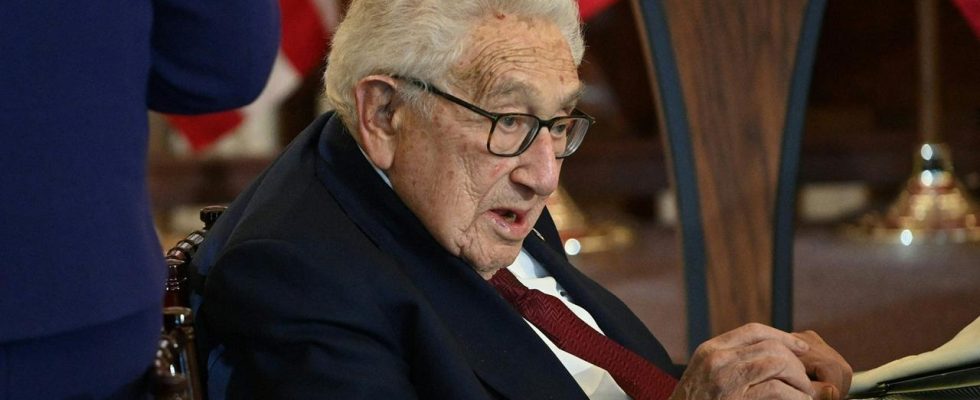Kissinger comes from Fürth and had to flee from the Nazis with his parents in 1938 – to the USA. They became his new home and the starting point for a great political career. His work: controversial. But today it is celebrated.
Henry Kissinger, former US Secretary of State and author, turns 100 today. Despite numerous awards, including the 1973 Nobel Peace Prize, Kissinger’s political work is still controversial today.
Henry Kissinger is a figure of the century in the truest sense. On May 27, 1923 – 100 years ago today – he was born as Heinz Alfred Kissinger in Fürth in Middle Franconia:
“I was a wild football fanatic. That’s how I always think of the football games I saw there. Overall, my memories of my time in Fürth were very positive. We didn’t have a radio and I read a lot. I have Schiller with me with the greatest enthusiasm. Goethe too, but I was still too young to understand him. Dostoevsky in German. I read a great deal as a child.”
In 1938 – at the age of 15 – he fled with his family from the National Socialists to the USA. He grew up in New York. As a youth he is said to have been so shy that he hardly spoke.
Perhaps one reason why Kissinger still has a strong German accent to this day. He remembers: “I was then in high school for a year. There I was supposed to write an essay about how I felt. I wrote at the time: I miss my friends in Fürth. But here in America, as a Jew, I can carry my head held high walk the streets. I didn’t feel any discrimination as an immigrant. Although I didn’t even speak English when I came here.”
US citizen since 1943
In 1943, Kissinger became an American and was drafted into military service. He fought in the Ardennes and later worked for US counterintelligence in his old homeland of Germany. “I was fortunate to be allowed to work on things that were so crucial to me: how to help rebuild a country first, like I was in the occupation as a young soldier. And then step by step of to work with higher positions to prevent these disasters from happening again.”
After studying at the elite Harvard University, he taught there and made a name for himself as a specialist in international politics. In 1969, Republican President Richard Nixon brought him into the White House as National Security Advisor.
On December 2, 1968 in New York, future US President Richard Nixon (M) appointed German-born Harvard lecturer Henry Kissinger (l) as his security advisor.
Kissinger later became US Secretary of State under him: “Nixon was a complicated personality. But in crisis situations he made courageous decisions. Looking back, I have to say that I even developed admiration for the way he fought – which yes then ended in disaster.”
Accusation: power politicians without scruples
After the “Watergate” scandal, Nixon had to resign. But Kissinger remained Secretary of State – even under Nixon’s successor Gerald Ford. Critics not only accuse him of being an unscrupulous power politician. In 1968, Kissinger is said to have prevented an imminent peace agreement in Vietnam in order to help Nixon win the elections, and to be partly responsible for the bombing of Cambodia.
A topic that he still doesn’t like to be asked about: “We bombarded every guerrilla unit that opposed us with drones and all sorts of weapons. That was the case in every government, regardless of which party. We’re talking about something here , which happened 60 years ago. That was a necessary step at the time.”
June 11, 1974, Bad Reichenhall: The then US Secretary of State Henry Kissinger (r) and his German counterpart Hans-Dietrich Genscher sign the town’s golden book when they first meet.
One of the most important political advisers
It is also unclear what role Kissinger played in the bloody putsch by General Augusto Pinochet against Chilean President Salvador Allende in the early 1970s or during the military dictatorship in Argentina.
One thing is certain: even though he has not held government office since 1977, he later continued to get involved politically as one of the most important advisers to Republican Presidents Ronald Reagan and George Bush.
And even at 100, the football fan from Fürth is in demand when it comes to foreign policy assessments:
When I was 15 in Germany, it would never have crossed my mind that I would be Secretary of State and do all those things. I belonged to a discriminated minority. If anything prepared me for this career, it’s growing up in chaos: war, experiencing very complex and dangerous situations. I have developed the belief that this extraordinary destiny is an obligation to do my best.

